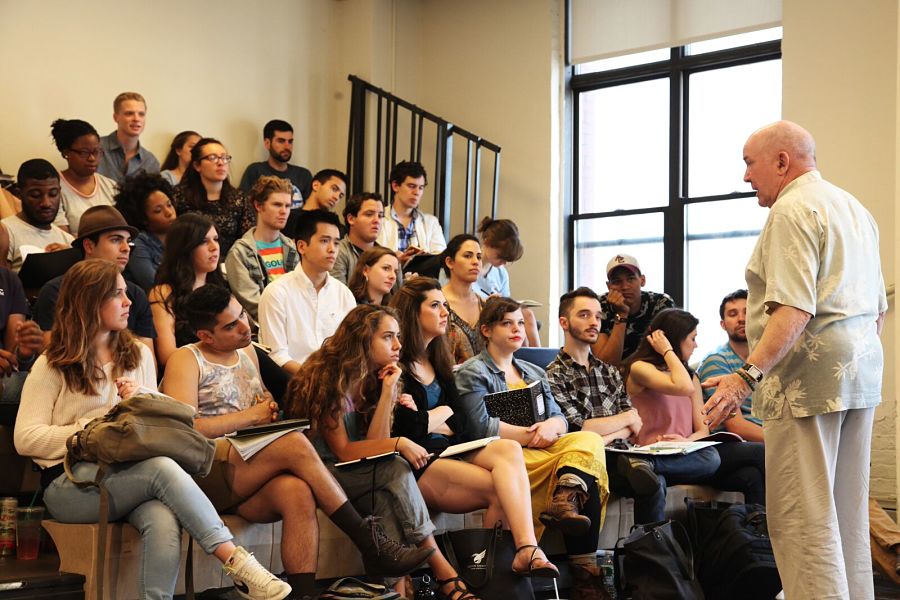NEW YORK CITY: It’s 10 a.m., and three-time Tony-winning director Jack O’Brien is on his feet and eager to work at Manhattan Theatre Club studios. O’Brien faces a studio of performers and says, “I sense the energy and talent in this room. I don’t know you, but I’m nuts about you already.”
No, O’Brien isn’t beginning rehearsals for a new Broadway show; he is leading a workshop and sharing advice with American Theatre Wing’s SpringboardNYC class.
Each year thousands of college graduates move to the Big Apple to kickstart careers in the theatre. The American Theatre Wing’s Springboard program is a two-week intensive designed to help to bridge the gap between isolated performing arts programs and the theatre industry in New York City.
“The program is something we are very committed to growing, because it is one of the three prongs that are central to what we are doing: making sure we have the next generation on the stage, behind the scenes, and in the audience,” explains ATW president and CEO Heather Hitchens. The Springboard class is made up of 36 actors and directors from across the country who’ve been chosen based on talent, but the program isn’t about perfecting monologues or stretching vocal ranges—it’s about how to make and sustain a career in New York theatre.
O’ Brien sure knows about longevity in the theatre, from his 25 years of experience as artistic director of the Old Globe to his recent star-studded Broadway revival of It’s Only A Play. And the Springboarders get the benefit of his witty humor, anecdotes, and tips. His audition advice: The point is “not to show off, but to show up—oh, that’s good!” he quips. O’Brien, who directed a Tony–winning revival of Porgy and Bess, then helps get a student’s rendition of “Summertime” audition-ready. As the session comes to a close, he effuses: “Clearly you guys have quality talent—you’re not generalized and you’re worth it. What a lovely experience this was” and he tips his baseball cap.
O’Brien is just one of the Springboard speakers to address the class over a few days of master classes, information sessions, trips to the theatre and an evening at the Wing’s Tony Awards.
Seconds after O’Brien makes his grand exit, Joel Perez (currently appearing in Fun Home on Broadway) is ushered into the studio. Perez knows exactly what to say to the room full of eager, budding artists of the Springboard program, because he sat in the same spot they did just a few years ago as a member of the Springboard class of 2008.
“You can be the most talented actor, but if you don’t know how to market yourself or even find auditions, it doesn’t matter,” says Perez. “At Springboard, I got lots of really practical knowledge about how to reach out to casting directors, how to get an agent, even how to get an apartment in New York.”
Ineed, the jam-packed Springboard curriculum offers things you don’t find on most college syllabi: how to find money jobs and temp work, how to pay taxes as actors, and how to manage money and sign a lease to an apartment.
The program offers students the opportunity to become acclimated with the city and to form relationships with the next generation of theatremakers. “You’re not here to get ahead, you’re not here to be competitive—you’re here to learn, and we’ve all gotten very close,” says Chapman University graduate Adam Sherman. Says Isabella Dawis, a recent graduate of the New England Conservatory, “I feel like we’ve been welcomed into the New York theatre community, and that’s something I wasn’t expecting to receive in such a large degree. We are treated as fellow artists and as colleagues by the mentors of the programs.”
The Springboarders are dismissed for a brief lunch break and prepped for their next information session with Tony winner Christian Borle, followed by an evening at the St. James Theatre to see the show he’s starring in, Something Rotten! There’s just one more day in the program, in which they will participate in a mock audition with leading casting directors before saying their goodbyes.
What happens after the two weeks? The program keeps on giving, with ticket offers, seminars, master classes, and resources offered through the American Theatre Wing’s Theatre Internship Network, which brings theatre interns and performers together for monthly panel discussions.
“Once you are in the American Theatre Wing family, you are our family,” says ATW’s Hitchens. “What’s nice is that the Springboard program and the Theatre Internship Network work hand in hand, and a lot of people step over to that program to continue the networking and the professional development. It is an ongoing relationship and we work with them, follow them, and try to help them all the way along.”
I can attest to that: I was a member of the Springboard class of 2014. The program helped me to settle into the city after graduation, form a group of supportive theatre friends, and ultimately land a job as a theatre journalist, which is why you’re reading this right now. The theatre business can be grueling, and it’s nice to have someone take you under their Wing.


